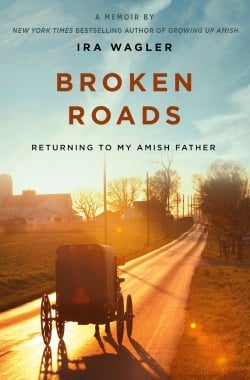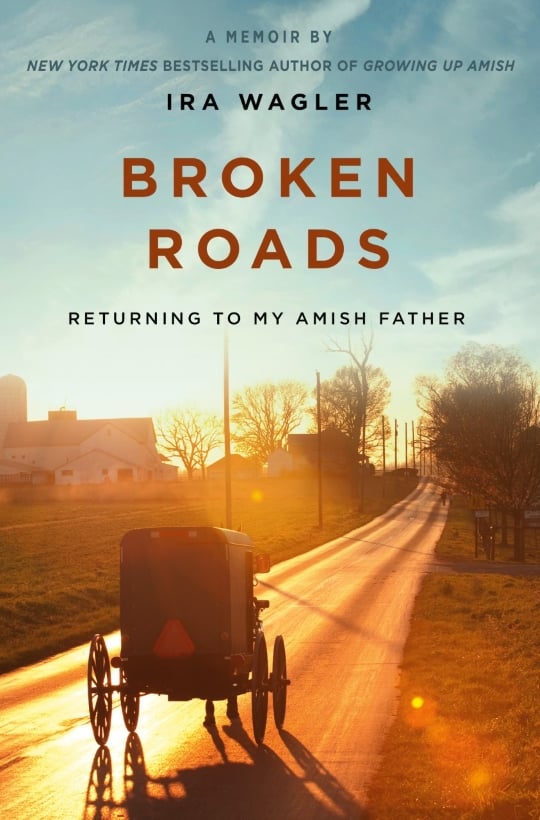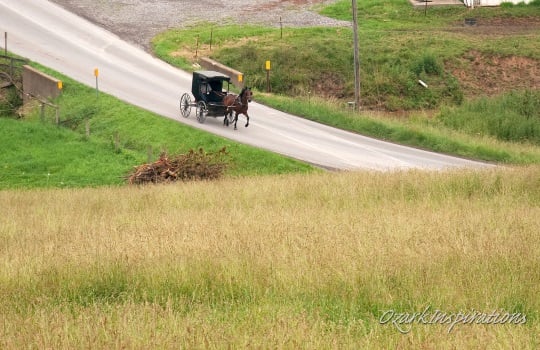Broken Roads Book Winners & Excerpt
We’ve got two winners today of Ira Wagler’s Broken Roads: Returning To My Amish Father. If you missed it, Ira discussed the book in our interview last week. This book follows up Ira’s first memoir Growing Up Amish.
 We also have the full prologue of Broken Roads to share with you today. Thanks to Ira and Hatchette Book Group for making that possible.
We also have the full prologue of Broken Roads to share with you today. Thanks to Ira and Hatchette Book Group for making that possible.
Broken Roads Giveaway Winners
I chose two winners at random using random.org. They are:
Comment #23: Carole Van Voorhis
Comment #76: Stephen
Congratulations, Carole and Stephen. You are each the winner of a copy of Broken Roads, courtesy of Ira. Please send a mailing address to me at ewesner(at)gmail(d0t)com, and Ira will have the books sent out to you.
Excerpt from Broken Roads: Returning To My Amish Father
PROLOGUE
THE AMISH HAVE been around for a long, long time. Hundreds of years. Today, around three hundred and thirty thousand of these incredibly unique people are scattered throughout the United States and Canada. Out of seven-plus billion people in the world. For such a small group, they have a tremendous presence in English society—not only in North America but globally. They are much romanticized, but that’s not their fault.
I was born one of them. Ira Wagler, the ninth of eleven children of David and Ida Mae Wagler, who emerged from the remote and rather despised Amish community in Daviess County, Indiana. I was the fifth son of a fifth son. My parents fled Daviess, as Dad was convinced the place was going bad. He didn’t want to raise his family there. So I grew up among my people in smaller communities. It was a long hard road, to break away. I guess I’m the one who remembers and who talks about things a lot, things that happened long ago. I wrote the story of my journey in my first book, Growing Up Amish, published in 2011.
Until my father and a few of his peers launched Pathway Publishers in the 1960s, the Amish never had much of a voice of their own. With Family Life magazine and the other Pathway publications, that voice was presented in a
coherent structure for the first time. It was an extraordinary achievement. Nothing like that had ever been attempted before. My father and his peers had a vision and pursued it. With unceasing labor, at great financial risk, and with potential loss of prestige. The venture succeeded beyond their wildest imaginations.
They published a lot of good, solid stuff, especially on historical subjects, and common-sense articles on farming and other issues of specific interest to the Amish. And yet I have always felt that the fictional writings and op-eds published by my father and others at Pathway were less than honest. Too much gooey mush. Too didactic. Too pat. Too formulaic and predictable. All the same answers, all the time. All the loose ends neatly tied up in a little package for the reader to remember.
Maybe they were projecting a moral ideal they knew was impossible. I think they were trying to live that ideal, too. To present themselves and their community as an example. But it’s impossible to be perfect. You can’t be a shining city on a hill by proclaiming your own greatness and glory. And real life isn’t a nice little list of neatly packaged formulas, either. Never has been. Never will be.
Over the years, I have wondered many times if my father and his contemporaries ever questioned the path they chose. The God they served. Did they ever despair that He exists? Question their faith? Or was it always cut and dried, black and white? When their children left and they cut them off cold, did it not tear at them deep inside? The hard, ruthless laws of shunning, did they ever think twice about them? And wish it were not so? Did they ever struggle with such issues? Or did their harsh, cold facades truly reflect their hearts?
I like to think they struggled sometimes. Weren’t so sure of themselves. It would have been human. But I don’t know that. Because they never told us. Maybe they thought it would show weakness. It wouldn’t have. To the contrary, it would have shown strength. And honesty.
And I think, too, of my grandfather, Joseph K. Wagler. My father’s father, a man I never met. Because he died when my father was young. What kind of man was he? I’ll never know. Nothing was ever told, other than the vacant, shallow depictions of a stern, godly father and deacon in the church. There is so much more I wonder about. How he looked. The man he was in the community. As he labored in the fields among his children. The sound of his voice when he prayed the morning prayer and read Scripture aloud in church. What gave him joy? And what were his quirks?
And my great-grandfather, Christian Wagler, who shot himself in the chest back in 1891 when he was thirty-six years old. His destitute widow remained, and his young sons and daughters. Christian was buried as a lost soul, there in the Stoll graveyard in Daviess County, Indiana. They knew, the Daviess people, that he was damned to burn in the fires of hell for all eternity. They knew, too, that the shameful stain of his suicide would haunt his seed forever.
Who was Christian? There are no photos. How did he look? Tall or short? And the demons he faced, in the dark recesses of his tortured soul, that finally overwhelmed him. Why did he do it? How was his last morning? What were his last words?
I’ll never know. I can only conjecture, because no one ever honestly wrote the details at the time. And I accept that. It’s who they were. Some things were just not done. Some layers not peeled back, the dark secrets carefully guarded. The old way, of the old generations.
But they left us poorer for our lack of knowledge of who they were. And who we are. Every culture and every generation brings forth its giants and its common people. Its common stories. Its tragedies. And its epics. But the characters involved cannot be seen and will not be heard and will be forgotten if no one speaks their names.
And tells of them. As they were. In their struggles. Their triumphs. With their flaws. Their impossible visions. Their failures. And their shining accomplishments. As they marched across the stage on which we now play our own roles.
That’s why I write.
You can find Broken Roads at Amazon in paperback, Kindle
, or Audible Audiobook
format.

Buy Broken Roads





Ira's new book
He has another story to tell, and I am anxious to read.
Sometimes I wonder, since reading the first book, if that troubled youth that is maybe still locked inside of him, will ever be able to relax, accept, and move on, or if just maybe it will always be there driving him.
He is now a grown man, with a lot of experiences, regrets as well as accomplishments, in his past. Will he ever be content to be the man who he has grown up to be? Is there happiness in his life, along with contentment, or will it always be just around the next corner and just out of reach?
We all have a past and a present. God tells us to be content.
But, are we?
I only hope he is…..Blessings to you, Ira Wagler.
Oral history
His writing has an undercurrent of emotion that I can feel.He has a lot to get off his chest. I’m curious how the story of his Grandfather’s suicide ever got to him a century later. Do Amish tend to hush such things or are they passed down as oral history? Doing genealogy I’ve discovered suicides that descendants never knew about.
Thanks for the Excerpt
Excellent writing. I want to read more..,
Broken Roads
Congratulations to the winners! I preordered the book and have read it.
I love Ira’s work. He has a way of writing that makes you feel you are right next to him in every detail/incident.
I am anxious to read some of his fathers published work.
I will always read any books released by Ira. So very interesting to say the least.
Glad you liked it Mary Ellen, I know a lot feel the same way. I wonder what Ira would recommend as far as his Dad’s writing. If you’re not familiar with Family Life that is also worth reading.
Thank you
Excellent writer. I subscribe to Family Life, Blackboard Bulletin, etc. and really love reading them. Your Dad had a vision when he and others started Pathway Publishers. What a wonderful way for people to stay connected and learn what’s going on. I don’t know you or your family, but wonder if perhaps they were hoping anyone who left a community would read what was written to stay aware of what was going on/how people were doing. I don’t know. As a mom, I wonder what it must have been like for any parent to shun a child. I hope that even when one is shunned, they still reach out to other family members some kind of way. As someone whose parent committed suicide decades ago, I can tell you – there is no rationale – you still wonder why? and why didn’t they reach out to someone…anyone? what was going on? This is the first thing I have read by Ira Wagler. I plan to order the book and any other by him. Congratulations to the winners. Best to you Ira.
Congratulations to the winners.
Fantastic book.. I couldnt wait for the paperback so I got an E-copy.. I couldnt put it down.
Congrats to the winners.
I enjoyed reading the Prologue and look forward to reading the entire book. If I remember correctly, after Ira Wagler’s first book was published, he had a book signing at the Simon J. Graber Community Center in Daviess County, Ind. I’m wondering if he is going to have a book signing for this book somewhere in Daviess County.
Al I will pass your question along to Ira.